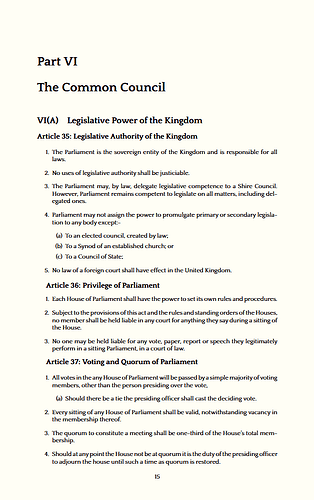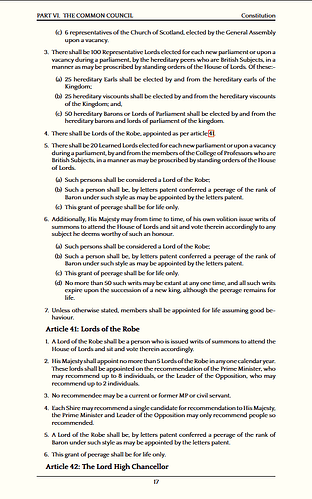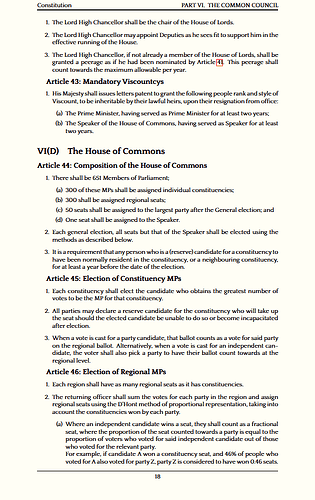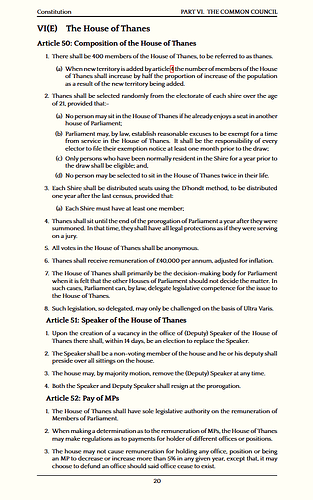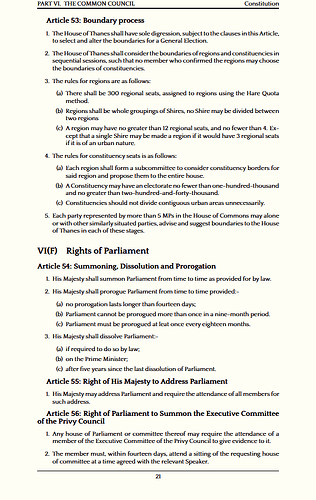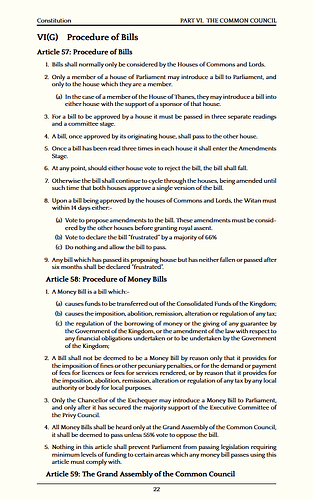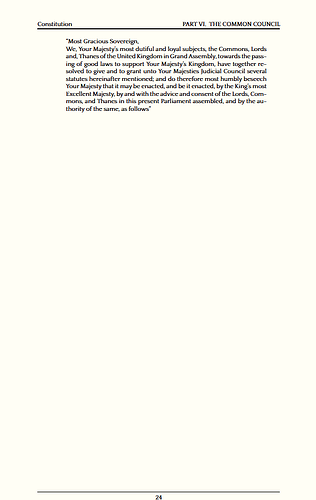Taspher’s Constitution Proposal
This is part of a series of threads I am making which cover the constitution of the UK and how we can fix it. You can find the main page for these threads here.
The Proposal
Explaination
This is the first truly long section. I like to imagine if David Starkey read this, he would cry tears of joy and sorrow at the same time for the recognition of the importance of Parliament, and also the bastardisation of what Parliament used to be. Unfortunately, I think that a little bastardisation is sorely needed.
I’ll take this by sub-part (as opposed to by Article in previous of these threads) to save time.
Part VI(A): This does a few things. Firstly, it reinforces the need for powers to be held by elected officials.
Secondly, it makes it clear that courts cannot overturn acts of Parliament (already the case)
Everything else is, I think, just a statement of current reality.
Part VI(B): The big thing here is Article 39. This, once again, is kinda already the case. The Glorious Revolution, the English Civil War, and all the other times we have tried our Kings has been for breach of coronation oath. This is just making the idea explicit in law (and will hopefully be less bloody than a civil war!).
Part VI(C): I view the removal of hereditary lords as a failure. In the same way that the King hopes to pass down the Kingdom and ensure the future prosperity of his family, so too do the nobles of this realm. As such, this part makes the HoL significantly smaller, and made up of about 50% hereditary peers. (You will have to look at the Great Council to get a better idea of who sits here)
We also significantly reduce the scope of life peerages to 5 per year. By requiring a nomination from a Shire Council, who can only nominate one person. This hopefully makes the process more transparent, and prevents failed politicians or civil servants just being placed in the Lords to retire.
Lastly, mandatory seats for former PMs and Speakers. This is just to stop the nonsense with Bercow, Cameron, etc. It was common for these people to always be put in the Lords, and I think with the bar of MPs being given life peerages, making an exception for them is the correct thing to do.
Part VI(D): A switch to AMS for election, but in a different form. This solves the issue of people voting for one party locally, but a different party regionally. The way that the additional seats are handed out is designed to ensure that the winning party has an MP in almost every constituency in the country (if people are interested, I can post results via this method from the previous election). In principle, we see the winning party get around 270 seats from 300 constituencies. It also encourages people to vote for the party they prefer, because they are more likely to get a MP in their constituency from that party.
Due to using a PR method, we make the Speaker separate.
Part VI(E): This is a novel idea, and I quite like it, but I am not sure. Basically, this is like a super-jury service. The idea of this house is that we randomly select members of the public to sit in it and do things that we would otherwise give to quangos. The pay of MPs and the boundaries for elections being prime examples of this.
The use of Thane is to harken back to the old Witan, to give the idea that these are just the people of the realm coming together to solve the issues of the realm. If there is a better name that people have, I would love to hear it.
The other thing that this house does is attempt to block bad legislation. But we will discuss that below.
Part VI(F/H): These two are mostly just recitations of reality again. Nothing more to add.
Part VI(G): Firstly, this repeals the Parliament Acts, and thus requires that all laws are passed by both the Commons and the Lords together.
Secondly, it gives the Thanes (says Witan sorry), the right to propose amendments, or attempt to block a bill.
Lastly, it creates a procedure for a joint sitting of all of the houses in order to pass legislation. This is what is used when the Thanes vote down a bill or in order to pass money bills (I am not a fan of Government shutdowns)
This last function is just for efficiency. As much as I think that the Thanes are a good idea, I don’t think that they should be able to block a bill in the same way as the other houses. However, they should how the power to block border-line legislation which is controversial and unpopular.
